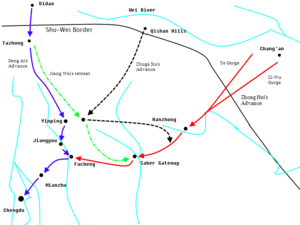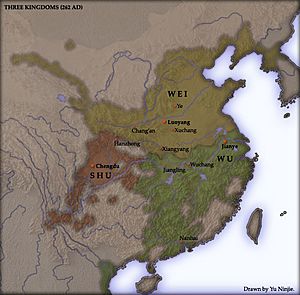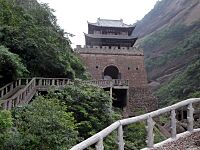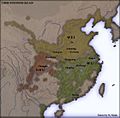Conquest of Shu by Wei facts for kids
Quick facts for kids Conquest of Shu by Wei |
|||||||
|---|---|---|---|---|---|---|---|
| Part of the wars of the Three Kingdoms period | |||||||
 Conquest of Shu by Wei |
|||||||
|
|||||||
| Belligerents | |||||||
| Cao Wei | Shu Han | ||||||
| Commanders and leaders | |||||||
| Sima Zhao Zhong Hui Deng Ai Zhuge Xu |
Liu Shan Jiang Wei Liao Hua Zhuge Zhan † |
||||||
| Strength | |||||||
| 160,000–180,000 | 90,000–102,000 | ||||||
| Conquest of Shu by Wei | |||||||
|---|---|---|---|---|---|---|---|
| Traditional Chinese | 魏滅蜀之戰 魏滅漢之戰 |
||||||
| Simplified Chinese | 魏灭蜀之战 魏灭汉之战 |
||||||
|
|||||||
The Conquest of Shu by Wei was a big military campaign. It happened in late 263 during China's Three Kingdoms period. The powerful state of Cao Wei attacked its rival, Shu Han. This war ended with Shu Han losing and falling apart.
For over 40 years, China had been split into three main states. This conquest changed everything. It helped set the stage for China to become one country again in 280. This happened under the Western Jin dynasty.
Contents
Why Did the Wei Attack Shu?
China's Three Kingdoms Period

After the Eastern Han dynasty ended in 220, three states fought for control. These were Wei, Shu, and Wu. Wei was the strongest. It had more soldiers, money, and land. Shu and Wu teamed up in 223 to fight against Wei.
Shu Han's Past Attacks on Wei
Shu Han had a general named Zhuge Liang. From 228 to 234, he led five attacks on Wei. These were called the "Northern Expeditions." His goal was to capture Wei's capital, Luoyang, and bring back the Han dynasty. But all his attacks failed.
After Zhuge Liang died, other Shu leaders focused on building up their own country. However, between 240 and 262, another Shu general, Jiang Wei, launched 11 more attacks on Wei. These also failed. These wars used up Shu's limited resources. They also made many people in Shu unhappy with Jiang Wei.
Wei's Leaders and Their Power
Meanwhile, in Wei, a general named Sima Yi took control in 249. After he died, his son Sima Shi became the leader. He made sure his family had all the power. Later, Sima Shi's younger brother, Sima Zhao, took over. He was the real power behind the Wei emperor.
Sima Zhao's Plan to Conquer Shu
In 262, Sima Zhao saw that Shu was weak. Its many wars had drained its resources. So, he decided to invade Shu and remove it as a threat. Only one of his advisors, Zhong Hui, agreed with him. Zhong Hui then helped Sima Zhao plan the attack.
Sima Zhao explained his plan. He said attacking Shu first was easier than attacking Wu. He believed Shu's army was small, with many soldiers guarding the capital. He thought Wei could trick Jiang Wei and then capture important passes. He felt that Shu's leader, Liu Shan, was not very good. Sima Zhao believed Shu would fall easily.
Another Wei general, Deng Ai, disagreed at first. He had been fighting Shu for years. Sima Zhao sent someone to convince Deng Ai. After that, Deng Ai changed his mind and supported the plan.
Wei's Three-Part Attack Plan
In late 262, Sima Zhao made Zhong Hui a top general. He gave him power over military matters in the region. Wei gathered about 180,000 soldiers for the invasion. They also started building warships for a future attack on Wu.
In autumn 263, Wei launched its attack on Shu. It was a three-part invasion:
- Deng Ai led 30,000 soldiers. They would attack Jiang Wei's position in Tazhong.
- Zhuge Xu led 30,000 soldiers. Their job was to block Jiang Wei's escape route.
- Zhong Hui led over 100,000 soldiers. They would attack Shu through the Xie Valley.
* Some of Zhong Hui's troops would also attack through the Luo Valley. * Wei Guan was put in charge of watching Zhong Hui and Deng Ai's actions.
Shu's Defense Plans
Changes to Shu's Hanzhong Defenses
Long ago, Shu's general Wei Yan had set up strong defenses in Hanzhong. He placed troops in many small camps to block invaders. Later, another general, Wang Ping, used this same plan to defend Hanzhong successfully.
However, Jiang Wei thought this old plan was only good for defense. He wanted a new idea. He suggested moving all troops and supplies to two main fortresses: Hancheng and Lecheng. His plan was to let the enemy attack these forts. This would stretch their supply lines. Then, Shu would use small, quick attacks to wear them down. When the enemy tried to retreat, Shu would launch a big counterattack.
In 258, Jiang Wei ordered these changes. He moved troops and supplies to the main fortresses. He also made other defense spots stronger.
Jiang Wei's Warning to Liu Shan
In early 263, Jiang Wei sent a message to the Shu emperor, Liu Shan. He warned that Zhong Hui was gathering troops and seemed ready to invade. Jiang Wei suggested sending generals Zhang Yi and Liao Hua to guard important passes.
But Liu Shan had a trusted eunuch named Huang Hao. Huang Hao believed in fortune-tellers. A fortune-teller said Wei would not invade Shu. So, Huang Hao told the emperor to ignore Jiang Wei's warning. The emperor listened to Huang Hao and did not discuss the warning with his court.
The Invasion Begins
In September or October 263, Wei's armies gathered in their capital, Luoyang. They were ready to go. Before leaving, they received rewards and had a military drill to boost their spirits. During this time, a Wei officer said Shu could not be conquered. Sima Zhao had him executed to warn others not to speak against the campaign.
Zhong Hui had ordered Xu Yi to build a road into Shu. But the road was poorly built. Zhong Hui executed Xu Yi for failing his job, even though Xu Yi came from an important family. This shocked the Wei army.
Wei's Reinforcements Arrive
In October and November 263, Sima Zhao ordered more Wei commanders to join the fight. They led troops from different areas to attack Jiang Wei's positions. Another commander, Liu Qin, led troops to attack Hanzhong.
Fighting on the Eastern Front
Battles at Lecheng and Hancheng
Around September or October 263, Zhong Hui's army moved through the valleys. He sent two groups of 10,000 soldiers each to attack Lecheng and Hancheng. These fortresses were guarded by Shu officers Wang Han and Jiang Bin, each with 5,000 troops.
Wang Han and Jiang Bin successfully defended their positions. Zhong Hui could not capture either fortress. So, he led his army past them towards Yang'an Pass. Jiang Bin later surrendered to Zhong Hui after Shu fell.
Taking Yang'an Pass
While Zhong Hui was attacking the fortresses, he sent Hu Lie to attack Yang'an Pass. This pass held important food and equipment.
The Shu general Fu Qian was defending Yang'an Pass. His officer, Jiang Shu, had been moved to this pass because he wasn't good at his old job. This made Jiang Shu angry at the Shu government. He secretly wanted to switch sides.
Jiang Shu tried to convince Fu Qian to fight outside the pass, but Fu Qian refused. Then, Jiang Shu lied, saying he would go fight while Fu Qian stayed behind. Fu Qian agreed. Jiang Shu led his troops out and surrendered to Hu Lie. With Jiang Shu gone, Yang'an Pass was weaker. Hu Lie attacked and captured it easily. Fu Qian fought bravely but died defending the pass. Wei soldiers admired his courage.
Fighting on the Western Front
From Tazhong to Yinping
Around mid-November 263, after a month of fighting, Deng Ai defeated Jiang Wei at Tazhong. Jiang Wei had to retreat towards Yinping. He then heard that Zhong Hui's army had taken Yang'an Pass and Hanzhong. Jiang Wei tried to retreat further, but Yang Xin caught him and defeated him again near Yinping.
Jiang Wei learned that Zhuge Xu had blocked his escape route at Wujie Bridge. So, Jiang Wei tried to go around Zhuge Xu. When Zhuge Xu heard this, he moved his troops back. Jiang Wei quickly turned around and crossed the bridge. Zhuge Xu arrived too late to stop him. After crossing, Jiang Wei went to the strong mountain pass of Jiange and set up his defenses there.
Shu Defends Jiange

Shu reinforcements, led by Zhang Yi and Dong Jue, joined Jiang Wei and Liao Hua at Jiange.
Zhong Hui attacked Jiange many times but could not break through its defenses. He even sent a letter to Jiang Wei, trying to convince him to surrender. Jiang Wei did not reply. Instead, he made his defenses at Jiange even stronger.
Zhong Hui also sent a long message to all Shu forces, urging them to surrender. He talked about how strong Wei was and how Shu had suffered from constant wars. He promised good treatment for those who surrendered early.
Zhong Hui's army started running low on food. He thought about giving up on Jiange and retreating.
Zhong Hui Takes Over Zhuge Xu's Army
Deng Ai had asked Zhuge Xu to join him on a risky shortcut to bypass Jiange. But Zhuge Xu refused because he didn't have permission. Zhuge Xu then led his army to join Zhong Hui at Jiange. Zhong Hui wanted to control Zhuge Xu's army. So, he secretly told the Wei court that Zhuge Xu was a coward. Because of this, Zhuge Xu was removed from command and sent back to the Wei capital in a prison cart. Zhong Hui then took control of Zhuge Xu's soldiers.
Deng Ai's Daring Shortcut
While at Yinping, Deng Ai came up with a bold idea. He would take a shortcut through the mountains. This path would bypass Jiange and lead straight towards the Shu capital, Chengdu. The shortcut was over 700 li long (about 250 miles) and went through very tough mountains.
Deng Ai and his men had to build bridges and climb steep cliffs. It was extremely dangerous. They soon ran out of supplies. Deng Ai himself rolled down a mountain wrapped in felt. His soldiers followed, climbing trees and scaling rocks. They fought off three Shu ambushes along the way.
Deng Ai's forces finally reached Jiangyou. Ma Miao, the Shu official in charge of Jiangyou, surrendered without a fight.
Battle of Mianzhu
After taking Jiangyou, Deng Ai's army pushed on to Fu County. There, they met Shu forces led by Zhuge Zhan. Zhuge Zhan's officer, Huang Chong, begged him to quickly take control of the mountains around Fu County. This would stop Wei from reaching the flat lands. But Zhuge Zhan hesitated. Huang Chong cried, urging him again and again.
Zhuge Zhan sent his first group of soldiers to attack Deng Ai at Fu County, but they lost. Zhuge Zhan and his remaining troops retreated to Mianzhu. Soon, Deng Ai sent a letter asking Zhuge Zhan to surrender. Zhuge Zhan was furious. He killed the messenger and prepared his troops for battle outside Mianzhu.
Deng Ai sent his son, Deng Zhong, and another officer, Shi Zuan, to attack Zhuge Zhan from the sides. They failed to break Shu's lines and told Deng Ai the enemy couldn't be beaten. Deng Ai angrily told them this battle was life or death. He threatened to execute them. So, they attacked again. This time, they broke through Shu's defenses and captured Mianzhu. Zhuge Zhan, his son Zhuge Shang, and other officers like Huang Chong, Li Qiu, and Zhang Zun all died fighting at Mianzhu.
Shu Han Falls
When Jiang Wei heard that Mianzhu had fallen, he led his forces east. Zhong Hui led his army to Fu County and sent his generals to chase Jiang Wei.
Liu Shan Surrenders
After capturing Mianzhu, Deng Ai's army moved closer to Chengdu, Shu's capital. Liu Shan, the Shu emperor, discussed what to do. Some suggested fleeing to their ally, Wu. Others wanted to retreat south.
Liu Shan finally listened to Qiao Zhou and decided to surrender to Deng Ai. One of Liu Shan's sons, Liu Chen, strongly wanted to fight to the end. But after his father decided to surrender, Liu Chen went to his grandfather's temple, cried, and took his own life.
Liu Shan wrote a surrender letter. He said that Shu was far from the Wei capital and had resisted for too long. He praised Wei's power and said his people would lay down their weapons. He sent his officials, including Zhang Shao, Qiao Zhou, and Deng Liang, with his imperial seal to Deng Ai. He also sent orders for all of Shu to surrender.
Deng Ai was very happy. He reported the victory to Wei and sent Zhang Shao and Deng Liang back to Chengdu. Liu Shan also sent a book with details about Shu, including its population, army size, and resources.
When Deng Ai arrived at Chengdu's north gate, Liu Shan tied himself up and brought a coffin. He led over 60 people to officially surrender. Deng Ai burned the coffin and freed Liu Shan. He treated Liu Shan kindly and gave him a new title. He also gave titles to other Shu nobles and officials. Deng Ai allowed Liu Shan to stay in his palace. He stopped his soldiers from looting Chengdu and ordered normal life to continue. The people of Shu were very impressed by Deng Ai's kindness.
Deng Ai appointed new officials for the former Shu territories. He also built a memorial at Mianzhu to honor his victory and bury the fallen soldiers from both sides.
Jiang Wei Surrenders
Meanwhile, Jiang Wei's troops received confusing news about Chengdu. Some thought Liu Shan would defend the city, others that he would flee. Jiang Wei prepared to move closer to Chengdu to find out the truth. Just then, they received orders from Chengdu to surrender to Zhong Hui at Fu County. Many Shu soldiers were so shocked and angry that they slashed at rocks with their swords.
When Zhong Hui finally met Jiang Wei, he asked, "Why are you late?" Jiang Wei, with tears in his eyes, replied, "Our meeting today came too early." Zhong Hui was impressed by Jiang Wei's answer.
Wu's Failed Reinforcements
In November or December 263, Shu had asked its ally, Wu, for help. In January 264, the Wu emperor Sun Xiu sent five officers to attack Wei territories. They hoped to distract Wei from Shu. But the Wu forces pulled back when they heard that Shu had fallen.
After the Conquest
Deng Ai's Arrest and Downfall
Deng Ai became very proud and boastful after his victory. Around February 264, he wrote to Sima Zhao with ideas to conquer Wu. When Sima Zhao said the plan needed court approval, Deng Ai grew impatient. He hinted that he could act on his own if it helped Wei.
Zhong Hui, who secretly planned to rebel against Wei, used Deng Ai's arrogance. He intercepted Deng Ai's report to the Wei court. He changed it to make it sound rude and demanding. He also destroyed a letter from Sima Zhao to Deng Ai.
In late February 264, the Wei court ordered Zhong Hui and Wei Guan to arrest Deng Ai. They were to remove him from command and send him back to Luoyang. In March 264, Wei Guan sent soldiers to kill Deng Ai, his son Deng Zhong, and his officer Shi Zuan. This happened west of Mianzhu.
Zhong Hui's Rebellion
After Deng Ai was arrested, Zhong Hui took control of all Wei forces in the former Shu lands. Jiang Wei then convinced Zhong Hui to rebel against Sima Zhao. They planned to attack Luoyang together.
On March 1, 264, Zhong Hui gathered all the high-ranking Wei officers in Chengdu. He showed them a fake order from the emperor, telling them to rise up against Sima Zhao. But he worried the officers wouldn't support him. So, he ordered his aides to take control of their units and arrest the officers.
On March 3, rumors spread that Zhong Hui wanted to kill all officers who refused to join his rebellion. The arrested officers broke free. They regrouped with their soldiers and started a revolt against Zhong Hui. Chaos erupted in Chengdu. Hundreds of people were killed. Zhong Hui and Jiang Wei fought the mutinying soldiers, but they were overwhelmed and killed.
Wu's Attack on Badong
During Wei's invasion of Shu, the Shu general Yan Yu was guarding Badong. He was ordered to take his troops to the front lines. His deputy, Luo Xian, stayed behind with only 2,000 soldiers to guard Yong'an.
In late 263, when news of Chengdu's fall reached Yong'an, Luo Xian kept the peace. After confirming Liu Shan's surrender, Luo Xian and his troops mourned for three days.
Meanwhile, Wu tried to take advantage of the situation. They invaded former Shu lands, pretending to send help to Shu. Around March 264, the Wu general Bu Xie attacked Yong'an. But Luo Xian and his men fought back strongly. Luo Xian sent a message to Wei, asking for help and showing his loyalty. He also fought back against the Wu forces and defeated them.
The Wu emperor Sun Xiu was angry. He sent another general, Lu Kang, with 30,000 soldiers to help Bu Xie besiege Yong'an. After six months, many people in Yong'an were sick. Just then, the Wei general Hu Lie arrived with reinforcements. The Wu forces retreated. Sima Zhao accepted Luo Xian's surrender and told him to keep guarding Yong'an.
Images for kids
 | George Robert Carruthers |
 | Patricia Bath |
 | Jan Ernst Matzeliger |
 | Alexander Miles |




